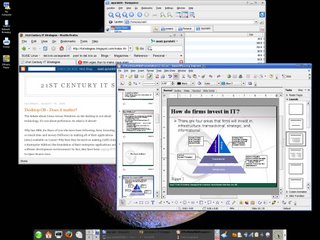Knowledge Workers are an important part of any IT strategy. Who you hire in key positions can make or break your organization. Who you hire in non-key but core positions can make or break its effectiveness and efficiency.
An excellent article, "Age at Work", in the June/July 2006 issue of Scientific American Mind discusses the differences between younger and older (over 50) workers:
...although older people may be slower at some tasks, they are actually faster at others, and in most cases they are less prone to mistakes. The research also reveals that only certain brain functions are affected by possible age-related deficits and that simple changes in the workplace can compensate for them.
The issue of hiring older workers will become more pertinent as the mean age of potentials employees continues its migration north. Lower birth rates and deferred retirements will mean that more of our potential pool of expertise will come from these people.
I have been involved in a number of engagements with various branches of, let's call them Company A,'s consulting arm and have been impressed by the number of older workers they employ. They are more seasoned, less likely to rush into things, bring a wealth of practical project experience to bear on any given task, and are revered by their younger colleagues. Of one Company A employee I heard a younger one say, when I mentioned that I thought his heat capacity calculations were wrong for our computer room, "Really, I don't think he's ever been wrong." In the end he was right - I was wrong (it's rare).
I have worked with more senior, over 50, individuals in this organization than in any other. When I discuss my concerns with younger individuals at Company A and other organizations they don't always understand simple things like how a commitment made by another of their colleagues and broken by them is a problem because in my mind it is clear that Company A made the commitment and not any individual. I look at them struggling to understand it on a gut, emotional, level. The older ones just get it and take ownership for their 'corporate entity's' actions and not just their own. This is a very simple, almost trivial example - there are many more. I am also only using Comnpany A as one example. I have worked with other organizations, both large and small, and have had similar experiences in all of them.
Older experienced seasoned staff can be worth their weight in gold.
